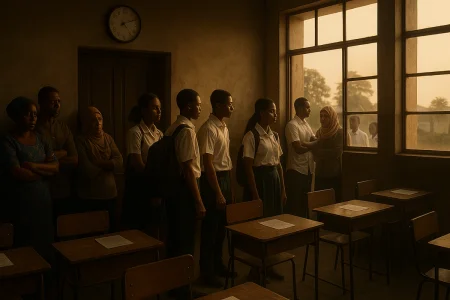
The Joint Admissions and Matriculations Board (JAMB) 's recent directive requiring candidates to arrive at examination centres by 6:30 AM has sparked a nationwide conversation. While the policy deserves scrutiny, journalist David Hundeyin's scathing critique of Nigerians' compliance raises even more profound questions about our society's relationship with institutional authority.
Between Compliance and Resistance: The Impossible Choice
Hundeyin's central question resonates beyond this specific controversy: "Why when presented with unreasonable behaviour, oppression, and power-tripping from any kind of authority, is the FIRST reaction of Nigerians to comply with whatever rubbish is asked of them, then to grumble afterward?"His frustration stems from parents sending their children into potentially dangerous pre-dawn situations simply because an examination body demanded it. With multiple regions facing security challenges and reports emerging of missing candidates, his outrage carries legitimate concern for youth safety.
Yet for many Nigerian parents, the situation presents an impossible dilemma rather than a simple choice of complying or resisting.
Across various social media platforms and radio call-in programmes, parents feel trapped between competing imperatives: protecting their children's physical safety versus safeguarding their academic future in a country where educational credentials remain crucial for social mobility.
Many express fear that individual non-compliance would punish their children without creating systemic change. With limited means to coordinate collective action and no clear alternative pathways to university admission, families report feeling that compliance, despite the risks, represents the "least bad" option.
Cultural Deference or Pragmatic Calculation?
The tendency toward compliance that Hundeyin criticises can be viewed through multiple lenses. Is it cultural deference to authority ingrained through our educational and social systems? Or is it a pragmatic calculation by people navigating systems where resistance carries heavy individual costs?Sociologists studying Nigerian institutional relationships point to several factors that may contribute to compliance patterns:
- Historical legacies of authoritarian governance that punished resistance
- Educational systems that emphasise deference to authority
- Limited institutional channels for effective complaint or redress
- Economic vulnerability that increases the cost of non-compliance
- Fragmented social solidarity that complicates collective action
This suggests that what Hundeyin interprets as spinelessness may represent rational responses to structural constraints—parents making difficult choices to protect their children's futures within a system they cannot individually change.
The Collective Action Problem
At the heart of this controversy lies a classic collective action problem. Individual resistance carries high costs but produces minimal impact. Effective resistance would require coordinated action across many JAMB candidates and their families.Yet Nigeria's social fragmentation along regional, religious, and socioeconomic lines makes such coordination exceptionally difficult. Without established mechanisms for collective mobilisation, families are left to make individual calculations that typically favour compliance.
This pattern repeats across numerous domains of Nigerian life—from traffic regulations to utility payments to institutional corruption—where the theoretical benefits of collective resistance remain unrealised due to coordination challenges.
Beyond Blaming: Toward Systemic Solutions
While Hundeyin's frustration is understandable, simply castigating parents for compliance may miss the opportunity to address the underlying structural factors that make resistance costly and coordination difficult.Meaningful change might require multi-faceted approaches:
- Creating multiple, flexible examination windows that reduce the high-stakes nature of any single testing date
- Developing more accessible grievance mechanisms that allow families to challenge unreasonable policies
- Strengthening parent-teacher associations and other collective bodies that could mobilise coordinated responses
- Implementing transparent policy development processes that incorporate input from affected communities.
Rather than simply condemning either JAMB's policy or parents' responses to it, perhaps this controversy offers an opportunity to reimagine how citizens and institutions might relate to each other, with greater accountability, transparency, and mechanisms for meaningful community input.
About the Author: The Nigerian Bulletin Community Team - reflecting on the ongoing JAMB controversy and diverse perspectives from across Nigerian society. The views expressed represent an attempt to understand multiple sides of this complex issue.




